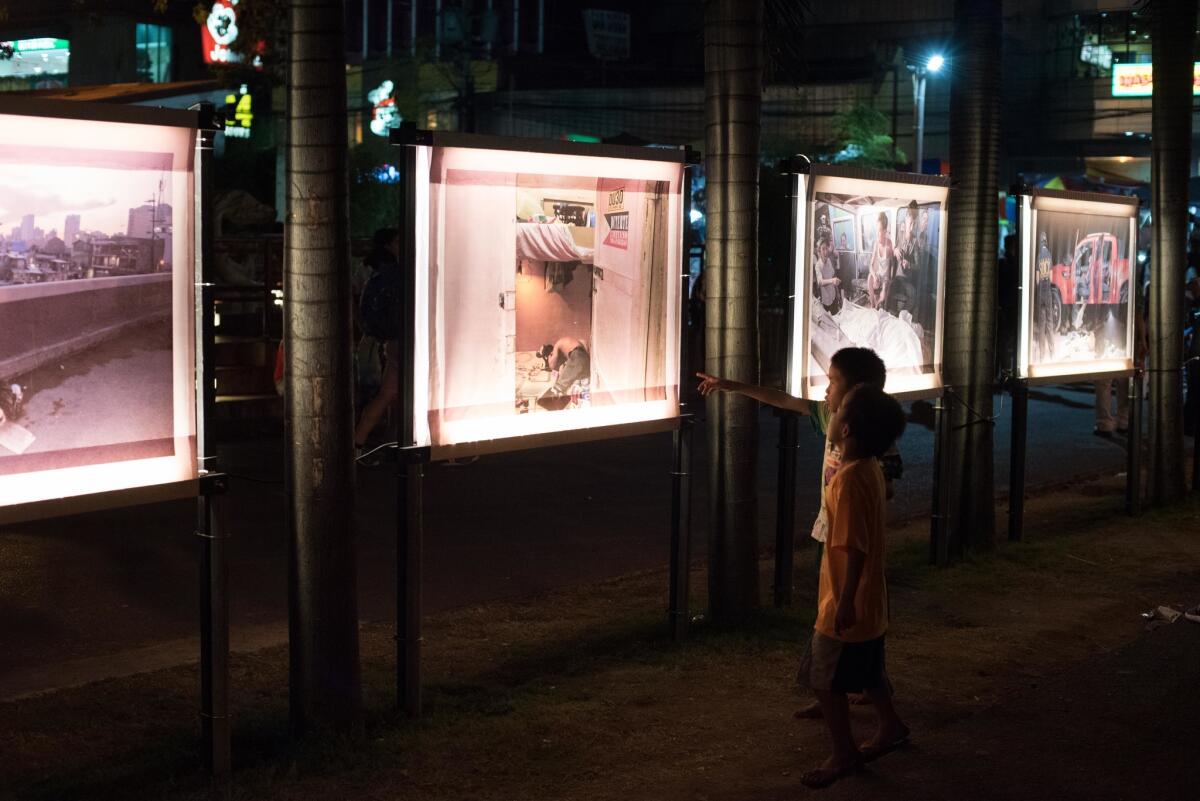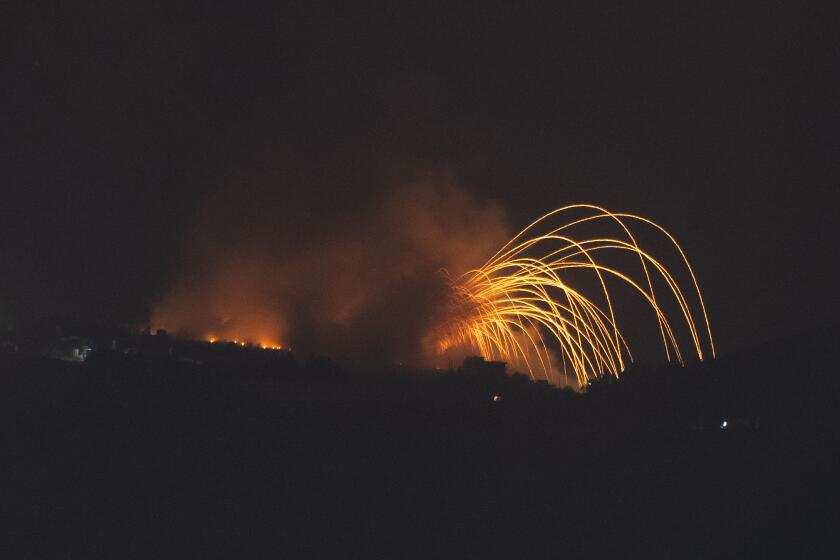Predawn services and the pall of the drug war mark Christmas in the Philippines

Reporting from Manila — At 4:50 a.m., the stragglers dashed through Manila’s darkened streets, hoping for a spot in the pews.
But they were too late. Hundreds of worshipers had already packed the Santo Niño de Paz Community Greenbelt Chapel, a low, white dome in a sprawling outdoor shopping complex, for Friday’s Simbang Gabi Christmas Mass.
For the record:
11:31 a.m. June 21, 2019An earlier version of this report misspelled Simbang Gabi as Simbag Gabi.
At least 100 more crowded on the pavement outside, singing “Glory to God” beneath a crisp crescent moon.
Christmas in the Philippines is a long, spirited and, to many, exhausting affair. About 90% of Filipinos are Christian, and they take the holiday seriously. Stores start playing Christmas music as early as September and don’t stop until early January. Christmas trees spring up in malls and public parks. Carolers go door to door singing “Jingle Bells,” “Silent Night” and “Ang Pasko Ay Sumapit”, a lively Tagalog tune celebrating Jesus’ birth. The holiday delicacy is lechon, whole suckling pig.
But nothing captures the Philippines’ Christmas obsession like Simbang Gabi, nine consecutive days of early-morning Mass ending Dec. 24. Some services start as early as 3 a.m.
Portuguese and Spanish missionaries brought Christianity to the Philippines in the 16th century, and in those days most converts were farmers. The holiday fell during harvest season, so Mass began early, allowing them to tend their crops at daybreak. The tradition stuck.
Politically, the Philippines has endured an unusual and highly controversial year, casting a pall over Christmas celebrations here.
If you don’t stop and the violence continues, this will be your last ‘Merry Christmas.’
— President Rodrigo Duterte, in his Christmas message, speaking to criminals
President Rodrigo Duterte, a former city mayor, campaigned on promises to kill tens of thousands of criminals, and since his June inauguration, more than 6,000 suspected drug dealers and users have been shot to death by police and vigilantes.
The vast majority have been poor, and few, if any, of their killers have been brought to justice.
“I’m only human, so I’ll still say ‘Merry Christmas’ to drug traffickers, thieves, corrupt criminals and those who’ve made life hard for Filipinos,” Duterte said in an early December message. “If you don’t stop and the violence continues, this will be your last ‘Merry Christmas.’”
On Wednesday, a Simbang Gabi Mass in Laguna province, about 20 miles south of Manila, was racked with violence. A man providing security for a Biñan City church, Allan Fernandez, was on an illegal-drug watchlist, according to the Philippine Inquirer. A gunman on a motorcycle arrived at the Mass and opened fire, killing him and a 12-year-old girl and wounding another bystander.
The priest reportedly ordered the church’s doors closed, and the Mass proceeded.
At the Redemptorist Church in Parañaque City, near Manila, church workers have installed a prominent exhibit of images from the drug war in an effort to raise awareness of its human cost. Large, framed photographs line the paths near the church entrance. Some show grieving families. One shows a victim lying on the pavement next to a cardboard sign reading “pusher,” his head wrapped in electrical tape.
Amado Picardal, a priest in the church, said the exhibit would run through Christmas Eve.
“This is meant to mirror what is happening in our society today, even in the midst of Christmas,” he said. “During this time, you would like to awaken the conscience of our people. There are a lot of people, a lot of families, who are grieving during this period of Christmas, during this war on drugs and the extrajudicial killings, and we’d like to pray for them and do what we can to stop the killings.”
At the Greenbelt Chapel — tucked among a Starbucks, a Banana Republic and an Urban Athletics outlet — Friday morning Mass began at 5 a.m. A white-robed priest spoke slowly and softly, drifting freely between English and Tagalog. He did not mention the drug war.
“Good morning, sisters and brothers. How are you — surviving or growing? There’s a big difference,” he said. “I ask you that question because many times we just let the days pass by without realizing how much the Lord is blessing us every night.”
He went on to deliver a sermon about loving one’s parents, the lessons of John the Baptist, and the “graciousness of God.”
Aivee Remo, a 27-year-old banker, said this was her third year of attending every Simbang Gabi Mass. “With all the Christmas festivities, it tends to make you tired,” she said. “Because you have parties, Masses, gifts — it all adds up.”
“It dies down eventually,” said her husband, Don, 43, a technology worker. “Usually it stops once you’ve seen all your friends and relatives, in the first few weeks of January.”
By 6 a.m., when the choir sang “Let’s Have a Christmas Celebration,” the moon was invisible, and as the sky brightened to turquoise, the crowd quietly dispersed.
ALSO
Suspect in Berlin market attack is killed by police in Milan shootout
The Iraqi government told Mosul residents to stay put. Now they are paying a heavy price
More to Read
Sign up for Essential California
The most important California stories and recommendations in your inbox every morning.
You may occasionally receive promotional content from the Los Angeles Times.










